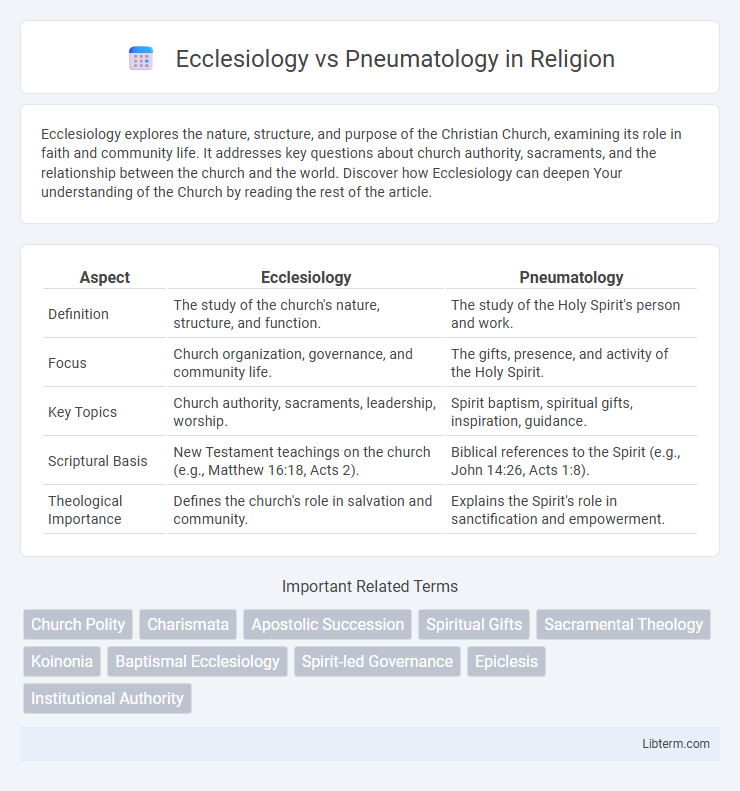Ecclesiology explores the nature, structure, and purpose of the Christian Church, examining its role in faith and community life. It addresses key questions about church authority, sacraments, and the relationship between the church and the world. Discover how Ecclesiology can deepen Your understanding of the Church by reading the rest of the article.
Table of Comparison
| Aspect | Ecclesiology | Pneumatology |
|---|---|---|
| Definition | The study of the church's nature, structure, and function. | The study of the Holy Spirit's person and work. |
| Focus | Church organization, governance, and community life. | The gifts, presence, and activity of the Holy Spirit. |
| Key Topics | Church authority, sacraments, leadership, worship. | Spirit baptism, spiritual gifts, inspiration, guidance. |
| Scriptural Basis | New Testament teachings on the church (e.g., Matthew 16:18, Acts 2). | Biblical references to the Spirit (e.g., John 14:26, Acts 1:8). |
| Theological Importance | Defines the church's role in salvation and community. | Explains the Spirit's role in sanctification and empowerment. |
Introduction to Ecclesiology and Pneumatology
Ecclesiology examines the nature, structure, and function of the Church as the body of Christ, emphasizing its role in salvation history and its biblical foundations. Pneumatology focuses on the study of the Holy Spirit, exploring its presence, gifts, and activity within both individuals and the community of believers. Understanding the distinctions between ecclesiology and pneumatology is crucial for grasping how the Church operates under the guidance of the Spirit in Christian theology.
Defining Ecclesiology: The Study of the Church
Ecclesiology is the theological study of the Christian Church, examining its origin, structure, authority, and purpose within the framework of Christian doctrine. It explores key concepts such as the nature of the Church as the body of Christ, its sacraments, governance, and its role in salvation history. This discipline contrasts with Pneumatology, which focuses specifically on the study of the Holy Spirit's role and activity within both individual believers and the Church as a whole.
Understanding Pneumatology: The Study of the Holy Spirit
Pneumatology examines the person and work of the Holy Spirit, emphasizing the Spirit's role in inspiration, sanctification, and empowerment of believers. Unlike Ecclesiology, which focuses on the nature and function of the Church as the body of Christ, Pneumatology explores how the Holy Spirit operates within both the individual and the corporate community. Key biblical passages such as John 14:26 and Acts 2 highlight the Spirit's guidance, revelation, and transformative power essential for Christian life and theology.
Biblical Foundations of Ecclesiology
The biblical foundations of Ecclesiology emphasize the Church as the body of Christ, established through the teachings of Paul in 1 Corinthians 12 and Ephesians 4, highlighting unity and diversity among believers. Ecclesiology draws from passages like Matthew 16:18, where Jesus declares the Church's establishment on Peter, underscoring its divine authority and continuity. Pneumatology, while distinct in focusing on the Holy Spirit's role, intersects with Ecclesiology in Acts 2, where the Spirit empowers the early Church's mission and communal life.
Scriptural Basis for Pneumatology
Pneumatology, the study of the Holy Spirit, finds its scriptural basis primarily in the New Testament, with key passages such as John 14:26 and Acts 2 highlighting the Spirit's role in guidance, empowerment, and sanctification. Ecclesiology, the study of the church, is scripturally rooted in passages like Ephesians 4:11-16 and 1 Corinthians 12, which describe the church as the body of Christ equipped by the Spirit for unity and mission. The interplay between Pneumatology and Ecclesiology is evident as the Holy Spirit's presence continuously shapes the identity and function of the church according to biblical teachings.
Key Differences: Church Structure vs. Spirit Experience
Ecclesiology centers on the organizational structure, authority, and governance of the Church, examining roles such as bishops, elders, and congregational dynamics. Pneumatology explores the experiences, manifestations, and gifts of the Holy Spirit, emphasizing spiritual renewal, charismatic expressions, and divine guidance within believers. While Ecclesiology defines institutional frameworks, Pneumatology highlights personal and communal encounters with the Spirit's power and presence.
Historical Developments: Ecclesiology vs. Pneumatology
Ecclesiology, the study of the church's nature and structure, historically evolved through early Christian councils emphasizing institutional authority and sacraments, contrasting with Pneumatology's focus on the Holy Spirit's role and gifts emerging prominently during the Pentecostal movement in the early 20th century. The Reformation era significantly shaped Ecclesiology by challenging ecclesiastical hierarchy and promoting sola scriptura, while Pneumatology's development was influenced by charismatic revivals highlighting personal spiritual experience and divine empowerment. These historical trajectories reveal a dynamic tension between structured church order and experiential spirituality in Christian theology.
Intersections: How Ecclesiology and Pneumatology Relate
Ecclesiology and Pneumatology intersect primarily in their shared focus on the Holy Spirit's role in the life and mission of the Church. Pneumatology explores the Spirit's presence and activity, while Ecclesiology examines the Church's structure and identity, integrating the Spirit's guidance as essential for unity and holiness. The dynamic relationship highlights how the Spirit empowers the Church for ministry, sacramental life, and communal formation.
Contemporary Debates and Challenges
Ecclesiology and Pneumatology intersect significantly in contemporary theological debates, particularly regarding the nature and function of the church in relation to the Holy Spirit. Challenges arise in balancing institutional authority with charismatic expressions, as theologians explore how the Spirit guides ecclesial identity and mission amidst secularization and pluralism. Debates also focus on synodality, spiritual gifts, and the Spirit's role in ecumenism, emphasizing the need for renewed pneumatological frameworks within church structures.
Conclusion: Integrating Church and Spirit in Christian Theology
Integrating Ecclesiology and Pneumatology in Christian theology emphasizes the dynamic relationship between the Church as the visible body of Christ and the Holy Spirit as its empowering presence. This synthesis highlights how ecclesial structures are vital for worship, community, and mission, while Pneumatology reveals the Spirit's ongoing role in guiding, sanctifying, and renewing the Church. Understanding this integration fosters a holistic theology where institutional faith and spiritual vitality coexist, driving effective ministry and authentic Christian life.
Ecclesiology Infographic

 libterm.com
libterm.com